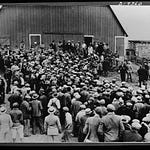This didn’t push to the podcast hosts; reaccomplishing.
—

I am against socialism.
If we oppose socialism, we must champion individualism.
Supporting individualism means we have a duty to enable every individual to succeed.
Milton Friedman (our subject of the last two weeks) wasn’t the only renowned economist of the 20th century whose ideas continue to influence US economic policy. Friedman was influential, no doubt. From the 1980s to the early 2000s, his emphasis on monetary policy, central banks controlling inflation, and the belief in free markets became the mainstream approach to economic management in many parts of the world.
But John Maynard Keynes is the father of macroeconomics. Each economist’s prominence fluctuates with the economic conditions of the time.
Since we considered our questions using Friedman’s ideas as a guide last week, we’ll start with Keynes this week.
To appreciate Keynes ideas, we need to explore the foundational concept of justice articulated by the ancient philosopher Plato. Plato’s justice provides a foundational understanding of societal roles and responsibilities.
Plato and Justice
Plato (427 to 347 BC) was a Greek philosopher and one of the most influential figures in Western philosophy and culture. He was a student of Socrates and taught Aristotle. The three form the foundational trio of ancient Greek philosophers whose ideas have shaped much of Western thought.
Plato founded the Academy, one of the world’s first universities. Many of his writings come from his time teaching there. He wrote in dialogue style, using stories to convey ideas.
His still-influential The Republic explores the “soul of a nation and an individual.” Its central theme is justice—how to create a society where individuals fulfill their roles and contribute to the overall well-being of the state. Plato divided society into three classes: rulers (philosopher-kings), warriors (auxiliaries), and producers (farmers, artisans, etc.). Each class has its specific role, and society achieves justice when each class fulfills its responsibilities.
It’s worth repeating: we achieve justice when each individual fills their role. Justice means individuals should be treated fairly and equally under the law, but it also means society upholds individual liberty for all. Justice for all means society strives toward individual opportunity and equitable distribution of resources like education, healthcare, and housing. While Plato didn't discuss modern concepts like public education or healthcare, we can extend his emphasis on each person fulfilling their role in today's context. Ensuring access to education and housing allows individuals to develop their abilities and contribute to society, aligning with Plato's vision of justice.
Justice includes education and housing. Justice enables people to work. Let’s consider an example from today’s America with a question:
Can you work and command a good living from society if you can’t access proper education and suitable housing? No.
Do the American people, acting through our elected representatives, sponsor and fund education and training, and control the conditions to shepherd the housing market? Yes.
Are we really saying it's the individual's fault if they can't secure a good job due to a lack of education and training or afford a home in our absurdly inflated market?
It’s a challenging question that John Maynard Keynes thought about a lot. Plato envisioned a just society where each individual fulfills their role for the common good. Similarly, Keynes argued that when the market fails to provide opportunities for individuals to contribute, it becomes the government's responsibility to step in. Both perspectives highlight that a society thrives when members are empowered to reach their potential.
John Maynard Keynes and Government Spending
John Maynard Keynes (1883 to 1946) was a British economist and the father of macroeconomics. More than any other economist, his ideas profoundly influenced modern macroeconomic theory. He is best known for developing Keynesian economics, a school of thought that advocates for active government intervention in the economy, particularly during recessions, to manage aggregate demand and maintain full employment.
In simple terms, this idea suggests that the government should help the economy during tough times, like recessions, by boosting spending to keep people working and ensure there's enough demand for goods and services.
Recent real-world examples of Keynesian economics are the government responses to the 2008 financial crisis and COVID-19. The economy was in trouble. The government injected stimulus funds by increasing spending, offering financial aid, and giving money to businesses and individuals. The goal was to boost demand to get people to buy things and keep people employed, helping the economy recover faster.
Keynes believed governments should actively manage economic cycles. He argued for deficit spending during depressions and recessions—borrowing money to finance public projects, infrastructure, and social programs. And he argued for government austerity during healthy periods. He claimed deficit spending would jump-start the economy, and once the economy recovered, the government could reduce spending and pay down the debt. During World War II, Keynes argued for funding the British war effort and that it was better to prioritize winning the war and maintaining the economy than to worry about balancing the budget.
Keynes understood that markets don’t always self-correct. People can’t just "work harder" to succeed. His solution was clear: when the private sector can’t provide enough jobs or income, the government has a responsibility to step in and keep the economy running by spending on public projects, infrastructure, and social programs.
He argued that when the market isn’t working, people need support. This support helps the individual and stabilizes society as a whole.
And he argued for government intervention as a temporary measure for use during periods of economic crisis. His central idea was that government should stimulate demand and create jobs when the private sector couldn’t. His goal was to jump-start the economy so that individuals could find employment and earn a good living once conditions improved.
In The General Theory of Employment, Interest, and Money (1936) he wrote: The boom, not the slump, is the right time for austerity at the Treasury.
Keynes argued that work should be the primary source of income for individuals. He believed the government should correct the market failures of too few good jobs. He argued the government should invest in education and infrastructure to create higher-quality jobs, making work more valuable. He supported a livable minimum wage as a means to distribute wealth fairly.
He wrote: The outstanding faults of the economic society in which we live are its failure to provide for full employment and its arbitrary and inequitable distribution of wealth and incomes.
Keynes did not advocate for permanent dependency on social programs. He argued for government intervention when the market failed to provide full employment and fair wages. His writings emphasized temporary government support, focusing on creating the conditions for self-sufficiency by addressing market failures.
In short, Keynes believed in setting rules that supported individual success. He advocated for government intervention in challenging times and for governments to pay off their debts in good times.
Though a couple thousand years apart, Plato’s philosophy and Keynesian economics agree on many points.
Plato and Keynes Intersect
Let’s break down Plato’s philosophy.
We achieve justice when every individual fulfills their role in society.
Society suffers if individuals cannot fulfill their roles due to a lack of opportunity, education, or resources.
Every individual must be able to contribute according to their abilities.
But what happens if you can't work to your potential due to a lack of education and training?
If you can’t access these resources, you can’t fulfill your role in society.
You’re stuck trying to survive, worrying only about basic needs like heat in the house and food on the table.
This condition is injustice because individuals are denied the opportunity to contribute and thrive.
And we examine Keynesian economics.
Work is the primary source of income for individuals.
Government must invest in education and infrastructure to create higher-quality jobs and make work more valuable. Plato argues that these are the same tools individuals need to fulfill their roles in society.
If the market doesn't provide adequate employment opportunities or wages, the government has to set rules for livable wages.
The intent is to create conditions for self-sufficiency, which reduces dependency on social programs and aligns with Plato's idea of enabling individuals to fulfill their societal role.
To lighten the mood and offer a fresh perspective, let’s introduce Jessica, insightful comedian, to share her thoughts on the state of our economic policies.
Jessica: Hey folks! Let's dive headfirst into the circus we call life, shall we? You ever notice how everyone has the ultimate fix for all our problems? It’s like being at a potluck where everyone brings their “world-famous” casserole. You've got the kale enthusiasts over here, chanting, “Kale will save us all!” Sure, Brenda, because nothing says “solution” like bitter leaves that taste like freshly mowed lawn.
Then Aunt Karen rolls in with her legendary tofu surprise. Surprise! It still tastes like disappointment. Listen, Karen, tofu wasn’t on anyone’s wish list unless that list is titled “Things That Pretend to Be Food but Aren’t.”
And speaking of solutions, let's talk about Uncle Sam’s idea of help these days. Handing out cash without any real support is like giving someone a spoon when they’re drowning. “Here, maybe you can paddle your way out!” It’s like tossing a life jacket to someone in a desert—thanks, but that's not really addressing the problem, is it?
Now, let’s chat about paychecks. You ever open yours and think, “Is this a typo or a cruel joke?” You work like a dog all week, and your bank account’s like, “Better luck next time!” It’s like ordering a steak dinner and getting served a single crouton and a side of air. “Enjoy your meal!” Oh, I will, once I find it.
We’re setting the bar so low, it's a tripping hazard. People celebrating that they can afford rent this month like they've won the lottery. “Yes! I get to live indoors for another 30 days!” Congratulations, you've achieved the bare minimum required for survival. Next up: dreaming about affording that extra guacamole at the burrito place.
Life shouldn’t be about just scraping by. It should be about thriving, reaching for the stars, and maybe snagging a moon rock or two. And let's be honest, who doesn't want a slice of cake to celebrate the little victories? Cake is essential, people! It's the edible high-five.
At the end of the day, we need to stop serving the same bland policy porridge and start whipping up a recipe that actually tastes good. Can we please retire the economic microwave dinners? I'm tired of peeling back the plastic to find half-cooked ideas and freezer-burned promises.
So let’s roll up our sleeves and cook up a feast where everyone’s invited, the portions are fair, and nobody leaves hungry—or hangry, for that matter. Because success isn’t about handing out snacks to keep people quiet; it's about giving them the ingredients to bake their own gourmet creations.
Thanks for tuning in, everybody! Remember, individualism isn't just about surviving—it's about giving people the tools to thrive and maybe, just maybe, a chance to have their cake and eat it too. Who’s up for dessert?
The Reality of Economics
The reality of economics is people don’t run on hope.
Jessica's witty observations highlight how quick fixes and handouts fail to address the root causes of economic hardship. Systemic solutions empower individuals.
People need a house to heat and money to put food on the table. This benefits the individual and society writ large. The proof of this statement is that liberal and conservative economists alike recommend social programs to alleviate poverty. They know if people don’t have enough money to survive from their work, the other source is the government.
But instead of thinking about how to make social programs work better, we need to think about how to eliminate the need for social programs.
We can make the rules work for individuals without hurting small businesses. We can pay for things like improving education to enable individuals to succeed.
If we refuse to do those things, we choose to pay for social programs.
Some argue that social programs lead to socialism. But socialism emerges when individualism fails.
I am against socialism.
If we oppose socialism, we must champion individualism.
Supporting individualism means we have a duty to enable every individual to succeed.
May God bless the United States of America.












